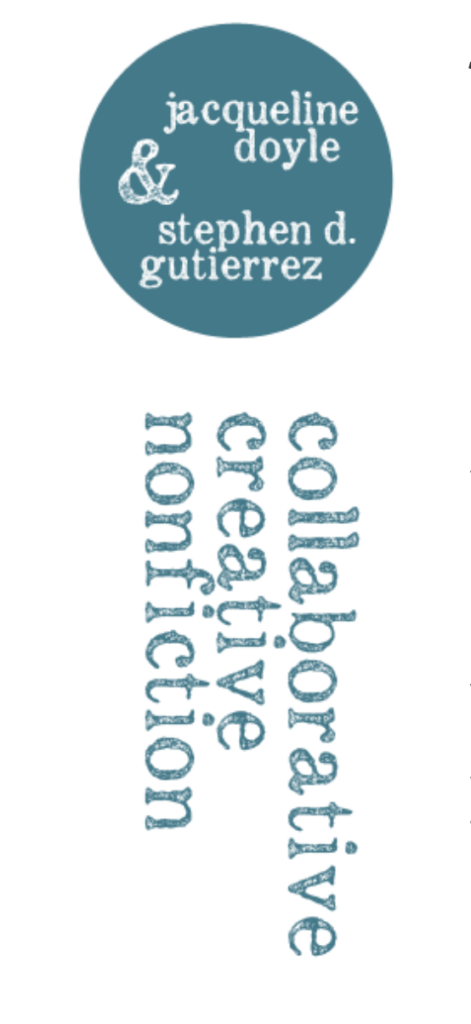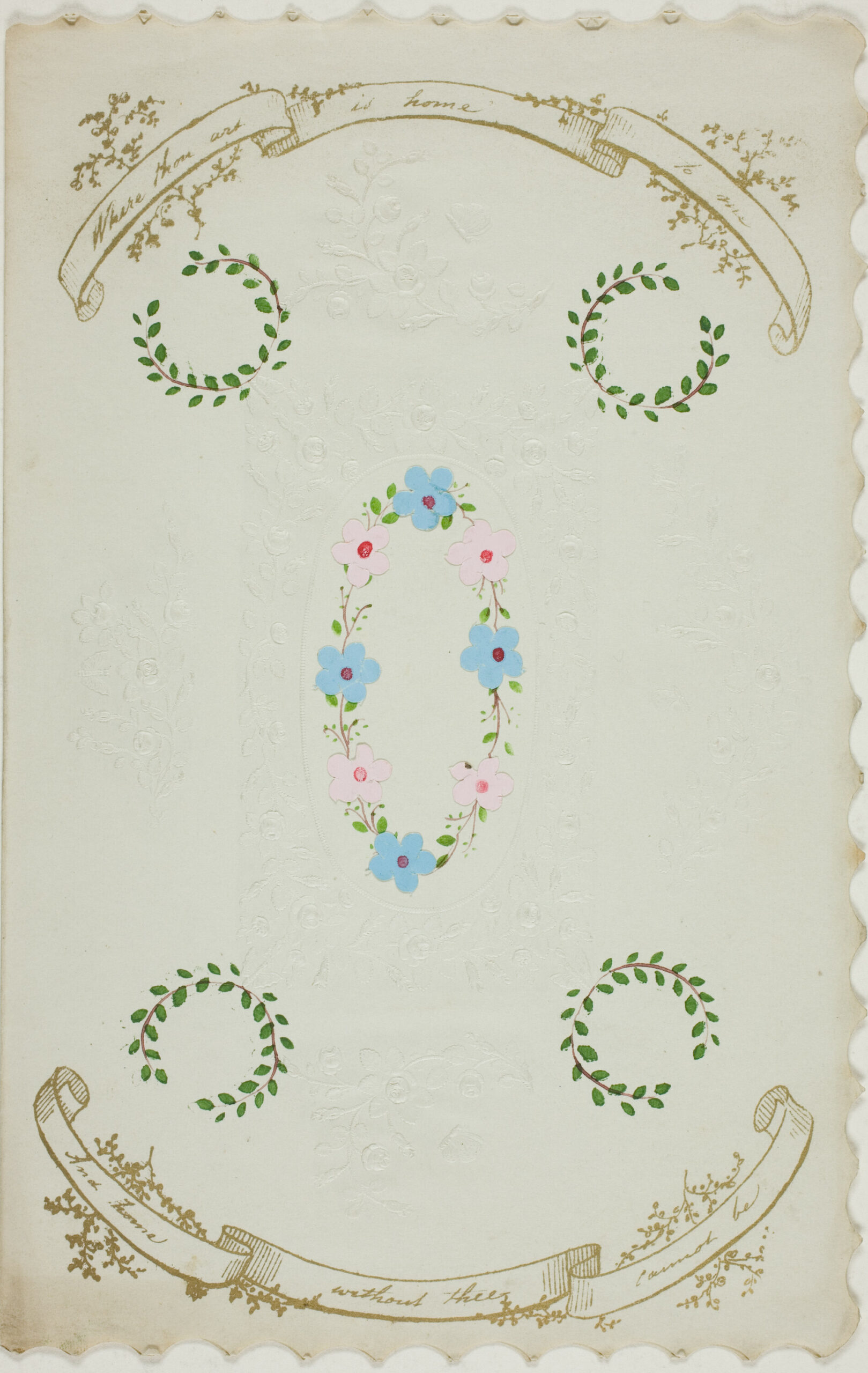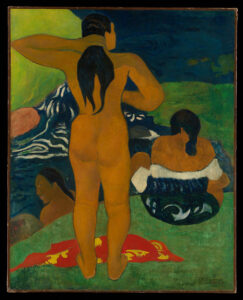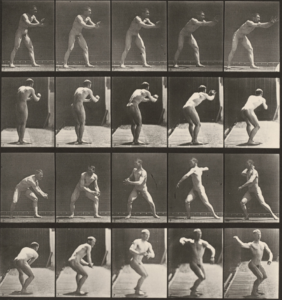Imaginary Friends
by Jacqueline Doyle and Stephen D. Gutierrez
To read Doyle’s and Gutierrez’s creative nonfiction, scroll down. Their piece can be found at the conclusion of the introduction.
Steve and I collaborated once before, on a segmented short story that came out in Timber. Inspired by an essay by two poets in Otoliths, I wrote a lyric opening and asked Steve to riff on my language and imagery, which he did, immediately transforming it into a story with characters, and I went back to develop characters in my opening section, and then we alternated back and forth, finding our rhythm, occasionally adding to or revising each other’s sections, but pretty much preserving the braided structure. (Timber did an interview with us about the process.) This time was different.
We’re having more difficulty collaborating on this introduction, by the way, than we did on our story in Timber or our essay here! What pronouns to use? Whose style? We tried a version that referred to what Jackie did and then what Steve did and then what we did, with no first-person narration at all, and it became hopelessly tangled, so here’s Steve:
It was different this time because it seemed more organic, more inchoate than the Timber story collaboration. With that one, as soon as I inadvertently or deliberately introduced a story aspect (Jackie wanted a lyric essay), it assumed shape, because a story contains an ending in its beginning, even if unknown. Narrative pulses with definite action that inspires more action that creates a nice problem for the writer – how to catch up to or conversely how not to be overtaken by the narrative wave, rather than how to get it going. With this hybrid essay, the idea behind it gave me less confidence to go forward, provided no burnable fuel to ignite. I had to blow hard on it. Here’s Jackie with some backstory:
A memoirist asked Steve if he’d like to propose a 2015 AWP panel with her on the boundaries between fiction and nonfiction; she wanted him to explore the fictional character “Steve” that recurs in his newest collection of stories and essays, The Mexican Man in His Backyard. He decided not to go ahead with the project, but we started talking about “Steve” over dinner and on our nightly walks. I suggested that we try to write about him, but since I wrote a number of the sections ahead of time, the dialogue between alternating sections didn’t get going the way we’d hoped. I tried out our first draft in my writers’ group in San Francisco and they couldn’t figure out who was talking where (as you perhaps can’t here). “Make it yours, Jackie,” my friend Alia said. “Claim it. See what you can do with it and then show it to Steve later.” I rewrote the essay, transforming Steve’s sections into the dialogue of our evening walks. This method seemed to work. There is more of my voice and academic concerns in the framework of the essay, but Steve gets to say the most. So here’s another bit from Steve:
In the end, more than anything, I’m glad we kept my line about my double: “‘Steve’ is a smiling version of hell.” I think it’s one of the strongest lines I’ve written in any genre. It strikes me as true, fictionally speaking, non-fictionally speaking or by any psychological criteria that can be applied, which is the whole point of our essayistic venture into the neighborhood woods in the end: in the double phenomenon we have the meaty personification of the fictionalized self pitted against or arm in arm with the protean, creative, non-fictional self, the real life self, that lying bastard. All great fiction writers are determined creative nonfiction writers and all first-rate creative nonfiction writers are circumspect fiction writers. It all comes from the same place, the truth inside us. Steve horrifies me, both the real one and the imagined one. Jackie’s got a different take:
Steve fascinates me, the real one and the imagined one, and here I’m not sure whether I’m talking about our marriage or our creative collaboration or, most likely, both. When we met in grad school, Steve was doing an MFA and I was doing a PhD. He’s more intuitive and I’m more analytical in my approach to literature. I started as a traditional scholar, and wrote a number of articles, until I realized how much I disliked academic rhetoric and dissecting the corpses of living texts (or is that vivisecting?). We both write in several genres. I consider myself primarily a creative nonfiction writer now, while Steve considers himself primarily a fiction writer. There’s a space for hybrid collaboration there, as different as our writing styles are. Steve comments:
The construction of “Steve” was Frankenstein-ish, which strikes me as a good way to describe collaboration, only instead of one mad genius it’s two doctors working different shifts on the same monster you hope turns out beautiful, and alive. More than anything, alive! Same methods apply. Jolt it! Payoff is the living thing. Risk is losing the juice that might go into a bigger, better, more awesome, personally inscribed monster. But all work in the lab, in the end, satisfies any unlicensed doctor like me. Jackie rocks in a different way than I do, so learning her motions—ha!—is in effect good for the creative body, the nimble mind. Can’t hurt. Can help.
In the end, collaboration is probably more difficult than writing something yourself, at least for Steve and me. But it’s great to see the monster stand up and lurch forward, taking its first steps, smiling that first baby smile. So he’s got stitches all over his face and walks with a limp. He’s ours!
Imaginary Friends
A friend of mine just learned from her much older brother that she had an imaginary friend in kindergarten. She’s agitated when she tells me. “I mean, is that normal?” And can’t believe she forgot her so completely. “Who was she? How is it possible that I don’t remember her at all?” I’m jealous that I never had one.
“What’s it like to have an imaginary friend?” I ask my husband Steve as we stride along on our evening walk. It’s dark and he holds a small flashlight at his side, which he switches on and points downward when a car passes. There’s a sliver of moon overhead in the sky.
Steve had an imaginary friend when he was five years old. The friend’s name was “Steve.” Steve—my husband Steve that is, the flesh and blood person walking beside me in the dark—writes fiction and creative nonfiction. Sometimes it’s hard to tell them apart. Two recurring characters in his fictional stories are a lot like him. One is named Walter. The other is named Steve. I never made the connection to his imaginary friend before. I guess because we’ve never talked about him. Now I wonder whether his phantom companion became his character.
We pass under a streetlight and for a moment Steve’s face is illuminated before his corporeal being becomes incorporeal again. I reach out and touch his arm in the dusk to make sure he’s still there.
“What was ‘Steve’ like?”
Steve thinks for a while.
“’Steve,’ as far as I can remember him, was an ideal friend, much like me, only better, only perfect,” he says. “I was excruciatingly embarrassed by my big ears as a kid, not normally large big ears but ears that stuck out at an acute 90 degree angle from my head. ‘Steve’ didn’t have them. ‘Steve’ wore a striped shirt like I did, a blue T-shirt with red and yellow horizontal stripes, standard kid’s wear for the time, but I think ‘Steve’s’ looked better on him, spiffier, brighter, newer. ‘Steve’ didn’t act better than me – he was me, only not me. These memories, I should add, are new to me. I never knew so much about him until now, being asked about him. But my answer strikes me as very true.”
Steve grabs my arm. “Watch out for the pothole, Jackie, you might trip!”
* * *
I’m curious. I do some research, scanning the Internet and our university’s online databases for reputable sources, arrested by a scholarly article here, an anecdote there. I learn that some children see their imaginary friends and can describe them in vivid detail, as Steve can, while some only hear them. Most know that they are imaginary, but some do not. Children develop language skills with their imaginary friends, improvise play scenarios, work out anxieties and fears, develop their identities, and find comfort with them. Writers are twice as likely to have had childhood imaginary friends as the population at large.
I’m particularly interested in imaginary friends as doubles of the writer, though of course they’re not always doubles. One writer friend tells me that her imaginary friend in preschool was a dinosaur. Another tells me that hers, named “Amy,” was not a friend but an enemy. In Poe’s seminal tale, William Wilson is dogged for years by his whispering double and unwelcome companion, until he finally plunges a sword through his heart. Borges seems ambivalent at best about his imaginary friend. As Borges and the other “Borges” stroll through the streets of Buenos Aires, the other “Borges” usurps Borges’ experience to write about it. “Little by little,” Borges writes in “Borges and I,” “I am giving over everything to him, though I am quite aware of his perverse custom of falsifying and magnifying things.” Or maybe the other “Borges” writes that. Borges admits he’s not sure.
After all, the story opens, “The other one, the one called Borges, is the one things happen to,” suggesting that the “other” Borges is Borges in his flesh and blood incarnation, while the narrator is the imaginary “Borges” who has translated his experiences into words. He tells us that their relationship is not “hostile”: “I live, let myself go on living, so that Borges may contrive his literature, and this literature justifies me.” Which sounds more like the Borges who walks the streets, stopping here to admire a sandstone arch, there to admire an intricate wrought iron gate, than the “Borges” who writes about it. One of them tells the story, but which one? Is it the one who “falsifies and magnifies”?
* * *
Steve’s interested in the research, but it’s not completely matching up with his childhood experience of “Steve.”
He muses. “One notion that seems missing in the scientific studies is that we hide in our doubles; they don’t seek us out so much as we create them to inhabit them without the discomfort of being, and then we blame them for existing as if we didn’t call them forth in the first place out of great need. Relieved of our psychological burdens, which are heavy, we both rejoice in the displacement of those burdens and reject their projection—is that the right word?—in the form of these frightening, annoying creatures who pester us exactly because we want ourselves back, our old bedeviled selves who we couldn’t live with in the first place.”
“So ‘Steve’ is more of a daemon than a companion?” I ask.
He pauses. “‘Steve’ is a smiling version of hell.”
* * *
The sky grows brighter as the moon waxes. Tonight the tree branches cast intricate shadows on the street, and seem to intertwine with each other. Steve and I walk through ourselves and each other’s thoughts and memories in the deepening twilight, retracing the same steps through our sleepy neighborhood that we do every night. We pass a subterranean storm drain and hear water rushing under our feet. We pass a gated driveway where three tiny dogs yip their combined greetings and warnings, a cacophony of indignant chihuahuas. We pass a dark cabin surrounded by a thicket of tall bamboo trees where the deafening din of tree frogs fills the air. The sound recedes as we walk on and becomes background noise to a quiet so profound that we can hear the faraway whoosh of the freeway.
I’m nosy about other people’s lives, and peer into their lighted kitchens as we walk by. Someone’s living room is illuminated by the eerie glow of large screen TV. Once in a while a shadowy figure looms in the darkness on the street. Someone passes with a beagle on a leash. Someone trundles his recycling and green waste bins to the curb.
“Cool that we’re both in Tattoo Highway at the same time,” I say. The latest issue of an online literary zine has just come out with creative prose from both of us.
“I know. It’s great.”
“You know everyone’s going to think the professor character in your story is you. That you had a breakdown and ended up in the mental ward. He looks like you. He dresses like you. He sounds like you.”
“So what. Let them think that.”
“But it didn’t happen. You don’t care what your students think?”
“No.”
The streets are filled with yellow leaves, wet and slippery from yesterday’s rain. It’s cold tonight, and I pull up the hood on my sweatshirt. We both teach at the same university. I know it doesn’t matter what our students think, but they’re so curious about our personal lives and I’m so private. Since both of us have published creative nonfiction about my breakdown (which was, shit, more than twenty years ago), they probably know already. I hid “Meeting the Virgin Mary” in a combined scholarly and literary journal that I thought nobody would find. Steve’s “The World Came Crashing Down on My Wife” came out in a literary journal too, but was just reprinted in his latest book. I don’t know how many copies students have brought to him for personal inscriptions. A lot.
“Your new story looks like nonfiction,” I say. “It’s not labeled fiction or nonfiction in the table of contents. Your professor story.”
“It’s a story.”
“Partly my story.”
“Well, yeah. But I know what the hospital was like because you were there. The weird vibe in that group therapy room.”
“Why put yourself there?”
“I don’t know. It fit. The professor tells the other patient right up front that he exaggerates.”
A city bus glides by, the interior lit, not a soul aboard.
That is, we’ve seen the bus before, but maybe tonight’s is a phantom bus. When I write creative nonfiction, I try to hold on to the facts. Occasionally an imaginary (but not entirely imaginary) bus intrudes.
“So why do you exaggerate?” I ask him.
* * *
Steve stops in his tracks.
“I don’t exaggerate. I write the truth. If it’s not recognizable as experience, it’s only because experience is paltry and needs to be revealed. By ‘exaggerating,’ I get at what’s behind the curtain.”
He resumes walking, and begins to gesticulate as if he’s in an imaginary classroom.
“Too many stories today are really concerned with the curtain, I mean fictional short stories. The contemporary short story has become little more than autobiography gussied up with the standard clothes of the genre, very much recognizable as a thing that actually happened. But a good short story should present itself as both fictional and credible in a different way—it should feel more made up at the same time it reads convincingly.”
He pauses.
“Produce magic on the page and we’ll forget that it actually happened. We’ll be too busy experiencing it. If you took one step down the hall with me in the psych ward I am happy. That step says more about me than the countless steps I take every day in the real world. It is true. I didn’t exaggerate.
“The carpet at the hospital you stayed in stared back at you when you looked down at it, a tight, gray, woven pattern, very mild, very calming, very drab, very exciting. I wanted to fall to my knees and eat it when I saw a thread sticking up.
“And you say I exaggerated in my story? I held back! Would that I had the courage to exaggerate! Look, my double, peering at me from the around corner! I saw his face pop out from behind the wooden fence! It was ‘Steve,’ with a mask on! A terribly hideous repulsive face! I want him gone! I can’t leave him to roam the streets! Where has my sweet, innocent ‘Steve’ gone? He was a sweet boy. I loved him. He loved me.
“I think I got more love from him than I did from my family at the time.”
I understand that, but I’m not sure why Steve’s double now wears a mask or has become so repulsive. Steve can’t really enlighten me either.
“He was there. He just popped up. He needs a double, too. Shit! We’re all in pain.”
* * *
That night I dream I’m in a forest clearing under a bright, not quite full moon. The night is clear, the sky awash with stars. Trees tower on all sides of me, dark and stately. I can hear tiny animals rustling in the fallen leaves and underbrush, the soft hoot of a faraway owl. I am face to face with what seems to be a man clothed in a cape made of twigs and leaves. He holds two large staffs made from branches, planted firmly in the earth, and wears a deer head with antlers that masks his face. We don’t speak, or if we do I don’t remember what passes between us.
* * *
More than once we’ve encountered deer on our walks. A lone stag with outsized antlers. Two does prancing delicately down Seven Hills Road. One time a doe and two fawns. They paused to gaze at us with startled eyes. We all held our breath as they looked at us, and we looked at them. And then with a few graceful bounds they disappeared.
I love Thoreau, and reread him every year when I teach my American literature survey. Near the end of Walden, he writes, “I fear chiefly lest my expression may not be extra-vagant enough, may not wander far enough beyond the narrow limits of my daily experience, so as to be adequate to the truth of which I have been convinced. Extra vagance! … I desire to speak somewhere without bounds; like a man in a waking moment, to men in their waking moments; for I am convinced that I cannot exaggerate enough even to lay the foundation of a true expression.”
And it was like that, the deer. There’s just no way I can describe the beauty, the deep hush of that encounter.
Maybe she can describe it, the imaginary friend I seem to have acquired in middle age. The other Jacqueline, who sits up late at her computer, her face illuminated by the glow of the screen. Maybe she can return to the darkness, the sliver of a moon, the wind that ruffled the tops of the tall trees, lifted the dry leaves on the street and sent them skittering. And then the extraordinary stillness, the three deer poised for flight.
* * *
I show Thoreau’s comment to Steve at dinner, and he continues his meditations on exaggeration during our after-dinner walk.
“Extraordinary to read this Walden passage! I don’t dare compare myself to Henry, but I think I was trying to say the exact same thing.
“The world is magical and has nothing to do with reality. I do not know what that means, only that it sounds good, and I will not veto it on the basis of its logic. I cannot defend the statement. It makes no sense, it is cheap, easy, trite, and yet it is grand, true, eternal!
“The deer are just deer, but what deer they are! Dear deer! They go bounding off in the night, and we both stand deer struck.
“I think Thoreau would say, ‘Deer me,’ but with such emphasis that the deer would absorb the speaker and render him helpless to resist even if he wanted to. ‘Deer’ is a verb engulfing Henry, and Henry is pawing at the ground with antlers on his head, head bowed, smiling happily for the first time in many, many years.
“The deer are magnificent.”
* * *
“Thus my life is a flight,” Borges writes in “Borges and I,” “and I lose everything and everything belongs to oblivion, or to him.” The extraordinary grace of the deer in flight brings me back to the Borges line, apparently the subtext of my reflections all along.
It’s hard to explain the chord that Borges touches in me in “Borges and I,” but it has something to do with loss. How much will be lost if I don’t write it down. How urgent my writing feels because I began so late in life. “I am destined to perish, definitively,” Borges writes, “and only some instant of myself can survive in him.” How important that instant of myself and its connection to the larger world seems in the face of mortality. How my new imaginary friend Jacqueline, the self who writes, feels separate from the self who experiences. Vital, dark and light by turns, multi-vocal, ephemeral, yet eternal. How I don’t always trust her as she waits, eager to cannibalize my experience and everyone’s around me in order to make it her own.
“Jackie,” she whispers, when I sit down at my desk. “Jackie.” And again. “Jackie.”
Like ghostly revenants, my other selves return to rescue my past from oblivion and populate my pages. Imaginary friends, imaginary enemies, they reassemble my scattered experiences, usurp them, transform them, and write them for me. They remember, they reimagine, they recount.
* * *
“Yes,” Steve says, “Exactly! And they destroy, they overturn, they demand an audience when we haven’t learned to speak yet.
“’Speak, bastard, speak,’ they say.
“’No,’ we reply, meekly, so they tear open our throats and rip out our vocal cords and stuff them in their mouths and speak for us.”
Steve continues with the royal “we,” or “majestic plural,” and I’m not sure I agree, but I’m caught up in his vision anyway.
“We are rendered mute in their presence, everything life-giving in us is taken by them, and they want even more, our immortal souls. ‘You have not been good enough for the earth,’ they say, with their eyes, their mad eyes, and then they begin to laugh, and howl, and dance in a little circle with antlers on their heads and encased in too tight, horizontally striped shirts till we drop in obeisance and beg forgiveness for all we’ve done wrong in our lives. ‘Please, please.’
“But they only lift our chins, romantically, and kiss us. ‘It is all a bad, bad dream,’ they whisper, and they disappear as quickly as they appeared. In a flash, they are gone, the smell of deer hangs heavily in the air, above, in a tree, a striped T-shirt entangled on a branch makes me want to jump and grab it.”
Steve suddenly leaps in the air. He seems to swipe at the moon.
“Steve, what are you doing?”
“Nothing. Exercising. Being silly.”
* * *
A city bus passes without stopping. It shifts gears on the hill.
“Remember the night we got on the bus?” Steve asks me.
“You mean the night we thought about getting on the bus?
“Whatever,” he says.
“I remember. It was like stepping into an Edward Hopper painting. The artificial light inside the bus, the blackness outside. We were looking from the inside out, and from the outside in.”
“And then the bus became a diner, and our imaginary friends were drinking coffee there in the silence.”









